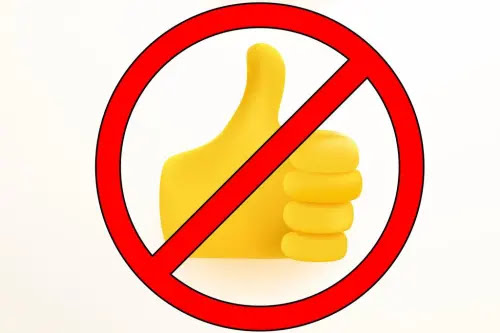
Gen Z calls out thumbs-up emoji as ‘rude’, wants to ban 9 other

The popular thumbs-up emoji, commonly used in casual and professional conversation, has Gen Z rolling their eyes. Calling out the emoji for being “rude” and “hostile,” Gen Zers are attempting to cancel the emoticon, along with nine others, stating that they feel ‘attacked’ whenever they see it used in the workplace. The thumbs-up emoji is seen as ‘passive-aggressive’ and even ‘confrontational’ by Gen Z, those born between the late 90s and the early 2010s.
During a recent exchange between Reddit users, a 24-year-old Redditor had the last word on the Gen Z argument: He wrote that thumbs-up emoji is best ‘never used in any situation’ as it is ‘hurtful’. After a Reddit poster confessed to being “not adult enough to be comfortable with the thumbs-up emoji reaction,” several others chimed in to agree and to call out other common emojis such as the red heart.
“For younger people, the thumbs-up emoji is used to be really passive-aggressive. It’s super rude if someone just sends you a thumbs up. So I also had a weird time adjusting because my workplace is the same,” the young Redditor wrote.
Using it makes you ‘officially old’
Communication in the new age has found new dimensions with the advent of emojis, which have eliminated the need to communicate using words and long sentences. Today, an emoticon can convey a lot more with fewer words. The thumbs up emoji is used in work-related chats to signal “I approve” or “I understood and will obey. However, if you use it, it’ll officially make you old, say Gen Zers, many of whom admitted that they used it only to communicate with boomers like their parents or older colleagues.
Also read: WhatsApp to get emoji reactions in Status feature in the future
The heart emoji, too, has fallen out of fashion, and out of Gen Z’s favour. A survey of 2,000 people conducted by Perspectus Global showed that a majority of people between the ages of 16 and 29 believe that you are “officially old” if you use thumbs-up or heart emoji.
On Reddit, some were less offended by the thumbs-up emoji but felt the heart symbol was actually the most inappropriate. “To me, the heart is reserved for friends and family, and has a more intimate meaning of love, while thumbs-up is just simple agreeing,” commented one person. “I actually find a heart emoji weird for work messages. I use heart emojis for things like when someone says ‘I got a new kitten,’ or ‘Susie did a really great job,’” added another.
Gen Z prefers typed out response
One anonymous office worker defined the issue as a “generational communication culture difference.” “Everyone my age in the office doesn’t do it, but the gen X people always do it,” a Redditor wrote. “Took me a bit to adjust and get out of my head that it means they’re mad at me.” Others complained that it comes across as dismissive.
One Reddit user noted that the thumbs up actually means that “I’ve read your message and have nothing [to] add and I hope and pray … all the bazillion people in this group chat have nothing to say on it too.”
Instead of using thumbs-up emoji, Gen Zers said they’d rather prefer a typed-out response. Several Reddit users agreed with the decision to cancel the emoji, saying that using it in a work environment makes the team members “unaccommodating” and seem “unfriendly.”
Also read: Emoji Day 2022: What’s the rolling eye, the wink, and the flying kiss?
Several studies regarding emoji have been conducted in recent years. A recent study suggested that including emoji in work emails actually makes you seem less powerful in your career. Another study suggested that using the infamous eggplant emoji is actually a major turnoff when it comes to dating. Here is the official list of “cancelled” emoji:
1. Thumbs-up
2. Red heart
3. “OK” hand
4. Checkmark
5. Poo
6. Loud crying face
7. Monkey covering eyes
8. Clapping hands
9. Lipstick kiss mark
10. Grimacing face
A brief history of emojis
Having originated in Japan in the late 1990s, emojis (“picture characters” in Japanese) went global in 2011. Today, emojis are deeply embedded in our 21st century culture and have spread well beyond our and into all corners of life. Over 90 percent of the world’s 3.2 billion Internet users regularly send emojis, with over 5 billion being transmitted every day on Facebook’s Messenger app alone, according to New York Post.
Finland became the world’s first country to brand itself with bespoke emojis in 2015 — the same year that Oxford Dictionaries, the world’s leading arbiter of English-language usage, declared the laughing emoticon a word. Emojis have become a part of our abbreviated digital life — social-media quips, texted jokes or flirting, chat messages for expressing sympathy or frustration. While some claim that emojis make us poorer communicators, others find the comparison of emojis with the language of Shakespeare — or even to language at all — nonsensical.

